May 28, 2025 | 19:40 GMT +7
May 28, 2025 | 19:40 GMT +7
Hotline: 0913.378.918
May 28, 2025 | 19:40 GMT +7
Hotline: 0913.378.918
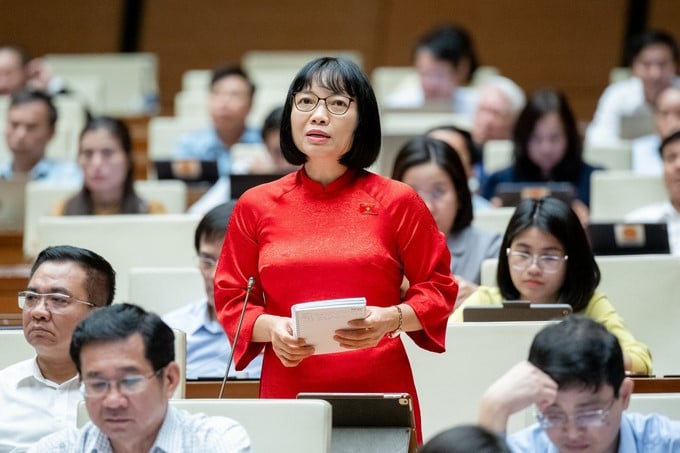
On June 4, Deputy Nguyen Thi Viet Nga questioned the Minister of Natural Resources and Environment about the solution to revive the Bac Hung Hai irrigation system, which is "dying" due to pollution. Photo: Quang Dung.
Deputy Nguyen Thi Viet Nga, Deputy Head of the Hai Duong National Assembly Delegation, asked Minister Dang Quoc Khanh to provide the solutions and plans of the Ministry of Natural Resources and Environment (MONRE) in the coming time for reviving "dead rivers" due to severe pollution, including the Bac Hung Hai irrigation system.
Answering Deputy Nga, Minister Dang Quoc Khanh said that the Bac Hung Hai system, Nhue-Day River, Cau River, etc. are actually seriously polluted. MONRE, along with localities, have actively participated in handling this problem, but not much has been improved yet. The reason is that industrial parks discharge waste into these rivers.
"We have basically controlled industrial parks. For example, Hung Yen province has issued its own standards. Accordingly, all discharges must meet column A. However, wastewater from industrial clusters and craft villages has not been thoroughly treated. This issue has been mentioned a lot, but resources to invest in collection and treatment systems are still limited."
According to Mr. Khanh, in one day, Hanoi City discharges 260,000 m3 into the Bac Hung Hai system, while 65% of the waste discharged into the Nhue-Day River is domestic wastewater and is untreated. For this issue, Hanoi has planned and implemented wastewater treatment plants in Gia Lam and Long Bien with a capacity of 180,000 m3 and 270,000 m3 to treat wastewater discharged into the Nhue-Day River. These are important works that contribute to reducing the amount of wastewater discharged into the environment. Therefore, Minister Dang Quoc Khanh requested that Hanoi City speed up and soon implement them in the coming time.
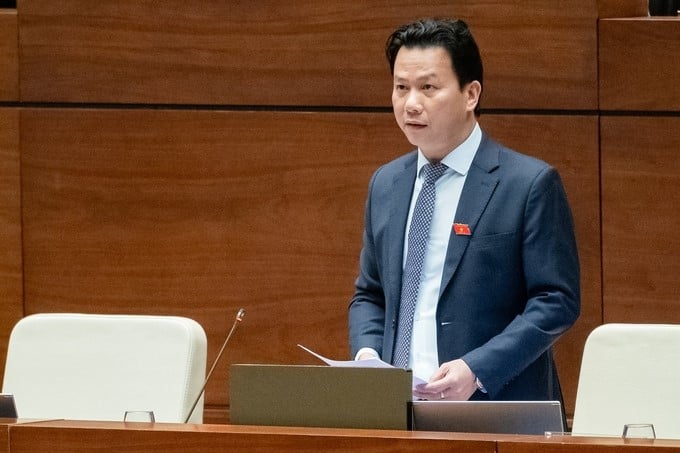
Minister Dang Quoc Khanh answered questions before the National Assembly. Photo: Quang Dung.
The head of the natural resources and environment industry commented that localities need to join hands to collect and treat wastewater in a synchronous manner. Besides, it is necessary to ensure flows and circulation in rivers. However, there was a time when the Bac Hung Hai canal was "hanging" and the water in the Red River could not enter.
Faced with that reality, the Prime Minister and Deputy Prime Minister directed the Ministry of Agriculture and Rural Development to invest in building a local pumping station for the drought season (at Xuan Quan sluice, Van Giang district, Hung Yen province). But actually, this is not a fundamental solution. It is necessary to consider the basic solution of retaining water and natural water flows with a large flow. Only then can the flow be regulated.
According to Minister Dang Quoc Khanh, the amended Law on Water Resources will take effect on July 1, 2024. MONRE will report to the Prime Minister to immediately establish a River Basin Management Committee. This will be the executive and coordinating agency, including the common responsibility of provinces, ministries, and branches.
Mr. Khanh added that MONRE has strengthened environmental observation and analysis of the river basin. There are currently 5 automatic observation points and 42 periodic observation points for the surface water environment. Besides, large discharge points of high risk are regularly observed and continuously connected to online data for inspection and supervision.
"In addition, MONRE is also inspecting and evaluating 11 rivers and discussing them with localities. One project is allowed to discharge waste at column A, but with 5–10 projects at column A, the river is still burdened with discharge, so load-bearing assessment is very important. Besides, dissemination and advocacy work also need to be promoted. Because, no matter how closely monitored, if the awareness of organizations and individuals is not high, it will be difficult for sustainable development."
The Minister of Natural Resources and Environment also proposed to pay attention to allocating resources from public investment for collecting and treating waste discharged into the irrigation system.
Debating with the Minister of Natural Resources and Environment regarding "dead rivers," Deputy Nguyen Huu Toan (Lai Chau) said that, according to the Minister's answer, polluted rivers pass through many provinces and have a large level of discharge. Therefore, Mr. Toan proposed to clarify MONRE's responsibilities in organizing the implementation of the Law on Environmental Protection when the situation of waste discharge and environmental pollution is increasing. At the same time, clarify how much time and resources are needed to comprehensively treat the current river pollution situation.
Responding to Deputy Nguyen Huu Toan's debate, Mr. Dang Quoc Khanh said that recently, MONRE has coordinated with the Ministry of Public Security and localities in inspecting, examining, and sanctioning violations related to the environment. The violations are mainly related to a number of polluted rivers; polluted clean domestic water sources and craft villages.
To solve the above-mentioned problem, MONRE has worked with localities in river basins to increase investment in the observation system, monitor, suddenly inspect, and strictly handle violations.
Regarding this issue, Deputy Nguyen Van Thi (Bac Giang) said that managing emission and discharge sources is an important solution in environmental protection, especially water pollution management.
Therefore, the deputy requested the Minister provide fundamental solutions in the coming time to well manage emission and discharge sources from industrial parks and clusters, craft villages, and domestic wastewater.
Answering Deputy Nguyen Van Thi's question about wastewater management, Minister Dang Quoc Khanh said that, just as the deputies reported, wastewater treatment is still limited, especially urban and rural domestic wastewater and wastewater from industrial clusters and craft villages. Handling this problem requires comprehensive solutions: resources, timeline, infrastructure investment, and attention from localities, ministries, and branches.
Regarding institutional policy, the Minister said that it is necessary to have public-private cooperation to ensure socialization sources; issue reasonable service unit prices for businesses to invest in wastewater treatment plants; strengthen the monitoring and observation work, etc.
According to the Minister, recently, MONRE inaugurated a Center for Data Integration and Processing and Environmental Monitoring to connect all localities and areas with large waste discharge sources and to step-by-step update, inspect, and resolve this issue. At the same time, strengthen inspection and supervision and strictly handle environmental violations, especially cases of intentional discharge of waste into the environment that do not meet requirements.
Translated by Thu Huyen

(VAN) On May 27, La French Tech Vietnam (the French startup and innovation community in Vietnam) held the French Tech Summit Vietnam 2025.
/2025/05/27/4731-2-223159_980.jpg)
(VAN) No votive paper, no styrofoam, no plastic bags, no plastic bottles, and no single-use plastic trays are the key rules tourists should keep in mind when visiting Con Dao.

(VAN) In the fight against plastic pollution, Vietnam has been demonstrating a proactive, pioneering, and active role in addressing the greatest environmental challenge today.

(VAN) The WOAH guidelines provide a vital tool for risk chain analysis, covering the extraction, transportation, consumption, and handling of confiscated wildlife.
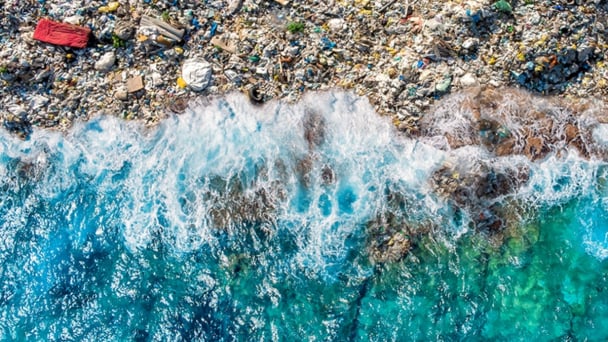
(VAN) World Environment Day 2025 is launched by the United Nations Environment Programme (UNEP) with the theme 'Beat Plastic Pollution'.
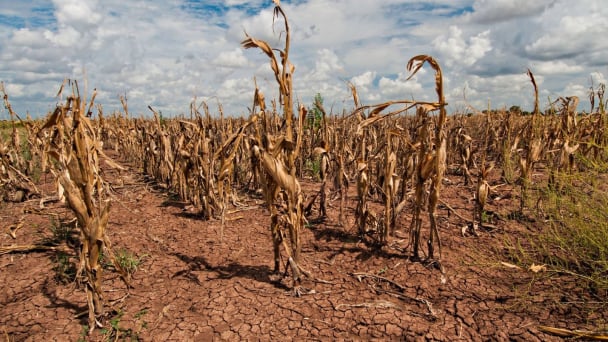
(VAN) As climate whiplash reshapes yields, experts say data-driven tools and targeted relief are critical to feed America.
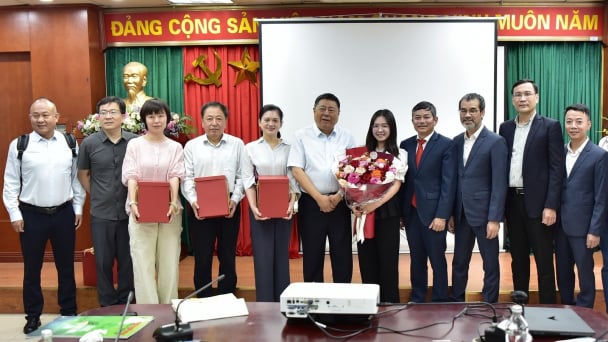
(VAN) The alignment in goals and operational direction between the Vietnam Agriculture and Nature Newspaper and Shaanxi Daily opens up promising prospects for journalism and media cooperation.